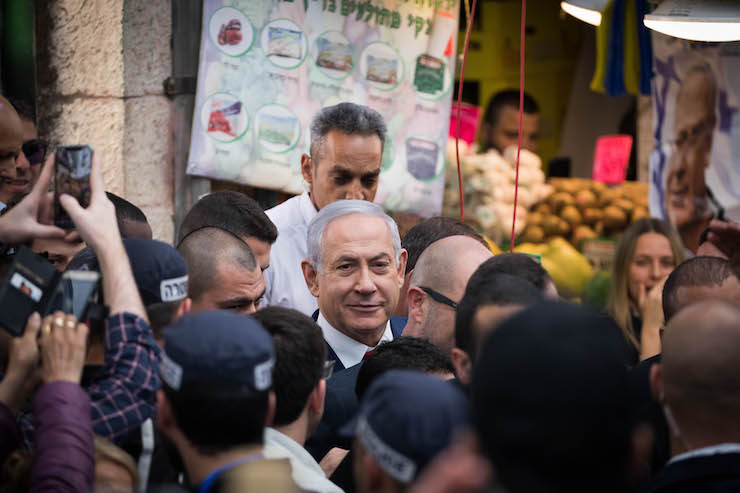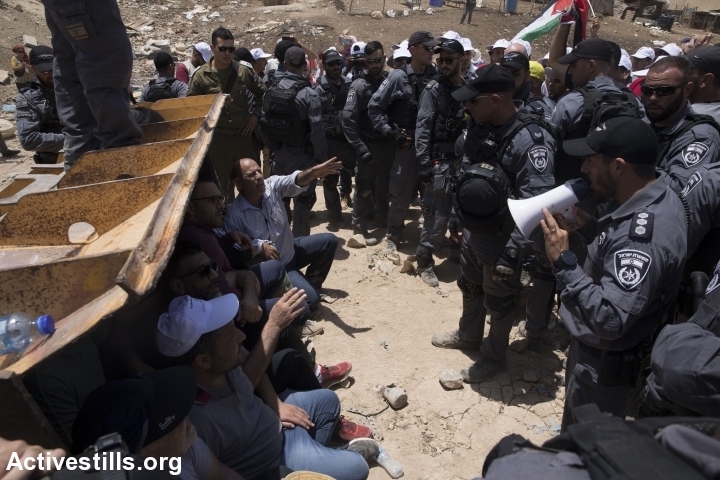These elections have turned into a referendum on the annexation of the West Bank — but that’s not something for Israel to decide. Five thoughts on Israel’s upcoming elections.

1.
In many ways Tuesday’s general elections in Israel seem fixed if you’re among the ranks of people hoping to see Benjamin Netanyahu end his decade-long reign as prime minister. Even if his challenger, Benny Gantz, wins a plurality of Knesset seats, besting Netanyahu’s Likud, he still doesn’t have the numbers to form a government.
As Dahlia Scheindlin has written here on numerous occasions, there is simply little chance that the blocs of parties — left, center, and right — change enough in size in order for a left-wing or center-left government to be formed. That is particularly true when you remove the Arab parties from the equation: no Arab party has ever been invited into a ruling coalition and the current candidates don’t seem eager to change that.
There is one wildcard, though. At the behest of Avigdor Liberman, Israel raised the election threshold from 2 percent to 3.5 percent in a bid to keep out smaller Arab parties. That didn’t work because the four small Arab parties ran on a joint slate, getting a record 13 seats together. This time, however, that higher threshold could be a game changer.
In the current election cycle, the right-wing bloc is saturated with smaller parties, many of whom are teetering on the electoral threshold. If they don’t receive 3.5 percent of the overall vote, their piece is simply removed from the pie, affecting the relative allocation of Knesset seats in each bloc.
There are 6,339,279 Israeli citizens eligible to vote on Tuesday. Assuming they all vote, if two right-wing parties get only 3 percent of the overall vote and don’t pass the threshold, that is more than 380,000 votes that aren’t going to any right-wing party. When the total number of votes garnered by each party is divvied up into 120 seats, therefore, the size of the right-wing bloc shrinks. The irony is that because the blocs rarely shift in size, the more successful Netanyahu’s Likud performs, the greater the likelihood that he siphons votes away from smaller right-wing parties.
Pollsters are woe to predict how that could play out, but all seem to agree that it could change the electoral map in a way that provides one of the few variables that could potentially destabilize the parliamentary math that otherwise guarantee another Netanyahu term.
However, things could also go the other way. The Joint List of Arab parties split in two in recent months and one of the two splinter lists is also straddling the threshold. If Ra’am-Balad doesn’t make it through but all the right-wing parties do, that would shrink the center-left bloc, making another Netanyahu victory even more of a sure thing.
2.
Last week, I wrote that these elections are a choice between resignation and despair, or a choice between the bad status quo and something even worse. Whereas last time around a vote for Netanyahu was a vote for the status quo, this time his challengers are offering the status quo of occupation and Netanyahu is promising change for the worse.
In other words, there’s no foreseeable outcome in which the situation gets better if you’re in the camp of people who want to see human and civil rights, an end to the occupation, and a less discriminatory and racist system in Israel-Palestine.
In the United States people often speak of presidential elections in terms of choosing the least-worst option. In Israel of 2019, hoping for the least-worst option is putting your faith in the slim chance that things don’t get worse.
3.
Speaking of things getting worse, aside from the possibility of even more unabashed racists who want to advance ethnic cleansing, we now have a better idea of what worse could look like. Netanyahu said on more than one occasion in recent days that if he is reelected, he will begin extending Israeli sovereignty to every last Israeli settlement in the still-occupied West Bank.
The idea that Israelis — and not Palestinians — are going to the polls to “democratically” determine the fate of Palestine is nothing short of absurd and antithetical to the idea of self-determination and democracy. (I wrote more about here.)

But what would Netanyahu’s vision of annexation look like? On the ground, probably not a whole lot. As I wrote, a creeping, de facto, annexation is already taking place and will continue to progress even if Netanyahu isn’t elected. But that doesn’t mean there aren’t any consequences. The more Netanyahu rips the mask off of policies that decades of Israeli administrations told white little lies about, primarily the fallacy that the occupation is temporary, the more the world will have to deal with its decision to buy into those falsehoods.
Israel’s decision to treat its undemocratic two-tiered military system of control over millions of Palestinians and their land while granting full civil and political rights to Jewish Israelis living on the same land as an occupation was strategic. Military occupation is by definition temporary. Likewise, the façade of Israeli buy-in to decades of peace processes that would presumably result in an end to that occupation, gave the world an excuse to not treat Israel as a regime that keeps a non-citizen population of millions under oppressive, discriminatory, apartheid-like conditions.
Of course, Netanyahu and the Israeli right never truly considered ending Israeli military control over the Palestinian territories. Netanyahu has been up front and open about that for years — all you had to do was listen. Now it will be much harder to cover one’s eyes and ears and other countries are going to have to decide what to do, now that it is impossible to ignore.
4.
The other thing that Netanyahu said in interviews over the weekend is that Israel will demolish the entire Palestinian village of Khan al-Ahmar within days. Some have posited that this would be a pre-election ploy. At this point, that is unlikely to happen before the polls open. But as nefarious and disgusting as that would be as a last-minute bone to throw to the right-wing base, the reasons for him to demolish the village in the days after the election are just as bad, if not worse.

If Netanyahu is tasked with forming the next Israeli government, it appears (before knowing the results) that it will be by far the most extremist right-wing, nationalist, and Jewish supremacist government this country has ever seen. In order to build that coalition, as counter-intuitive as it may sound, Netanyahu will have to prove his right-wing bona fides to the far-right parties he needs to court. Demolishing Khan al-Ahmar is one of their loudest demands, and Netanyahu’s reluctance to demolish it thus far has been one of their chief complaints against it.
The reason Khan al-Ahmar hasn’t been demolished so far, remember, is that the prosecutor of the International Criminal Court made an unambiguous warning to Israeli leaders and military officials that carrying out those plans is a presumptive war crime. “[I] continue to keep a close eye on the developments on the ground and will not hesitate to take any appropriate action,” she said.
All of that is, of course, secondary to the human devastation that would necessarily result from the despicable criminal act of forcibly displacing an entire village.
5.
Lastly, and there’s too much to get into on this one, is the looming indictments that Netanyahu is facing. The consensus among Israeli political analysts is that with the threat of imprisonment so real, Netanyahu will do just about anything in order to ensure his survival. The most likely manifestation of that desperation is probably broad capitulations to extremist political demands by far-right parties in exchange for guarantees of ensuring immunity of some sort. His demands to ensure his survival, however, could put the Israeli political system into a severe constitutional crisis, especially considering Netanyahu has said he will refuse to resign if and when he is indicted.
So here’s to things not getting worse.

